Abstract
Knowledge of cancer prevention and control was defined in terms of prevention, etiology, treatment, symptoms, cancer rates, screening, and detection examinations. A survey of 86 African Americans and 68 white Americans in Alameda County, California was completed in 1985. An index comprised of 69 knowledge items was assessed. A multivariate analysis of race, education, socioeconomic status, and occupation confirmed that these characteristics were independent predictors of knowledge. Blue collar work status was the most important predictor of low knowledge levels. African Americans were less knowledgeable than white Americans with regard to diet in preventing cancer and treatment modalities for cancer, and were most likely to perceive surgery as contributing to metastases. Low education and income status predicted low levels of knowledge. An important consideration in changing knowledge levels is the need to translate technical information about treatment and metastases in ways that are effective in reaching target populations at risk for low levels of knowledge. Cancer prevention and control programs need to develop materials and strategies that are responsive to communities whose members are predominantly African Americans or blue collar workers, or have low levels of education and income.
Full text
PDF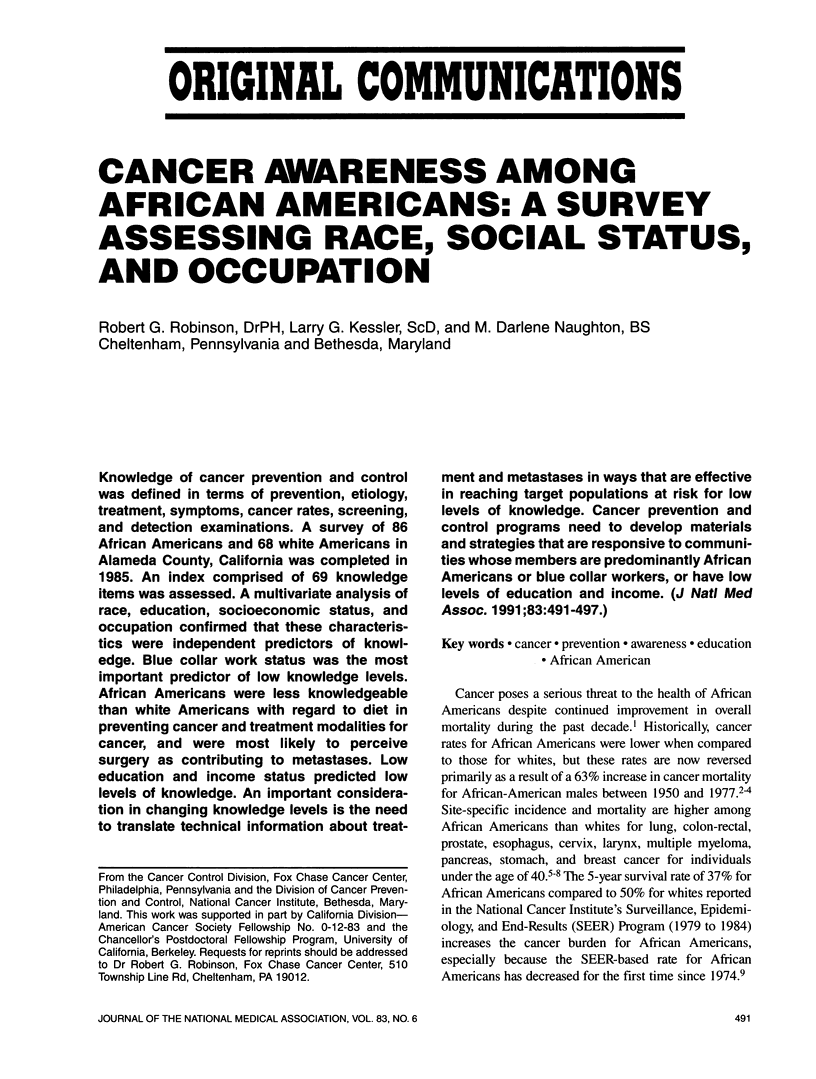
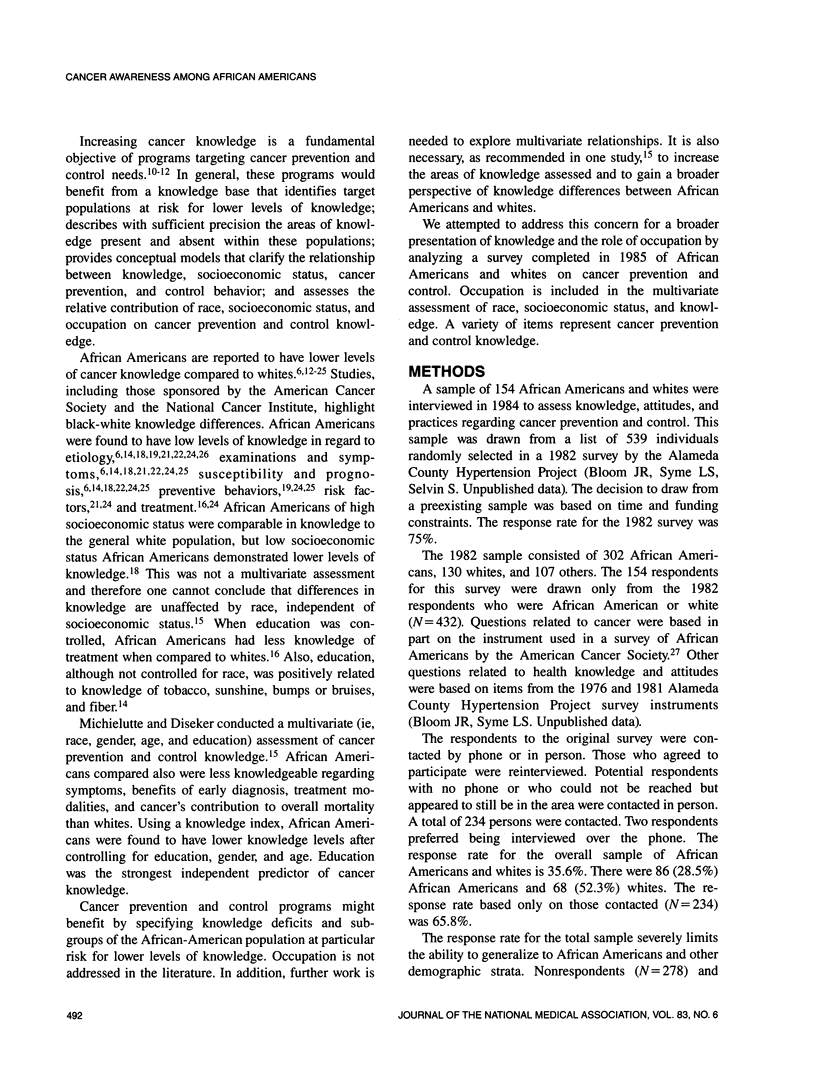
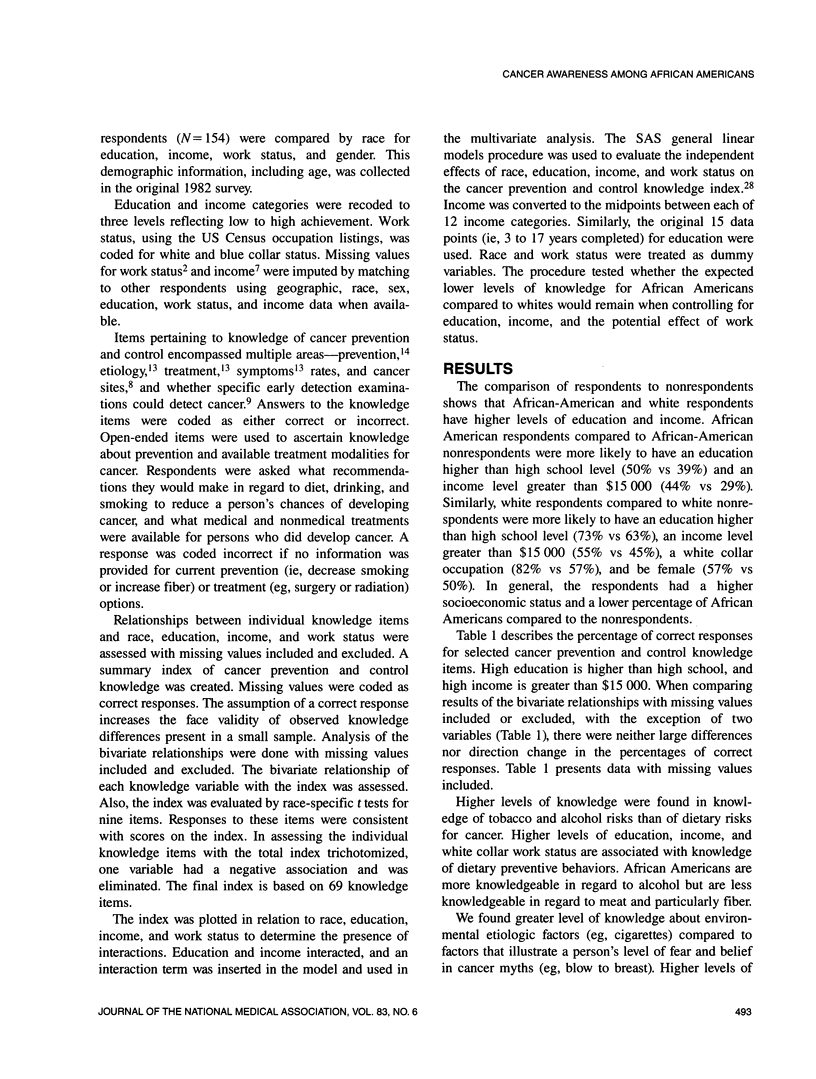
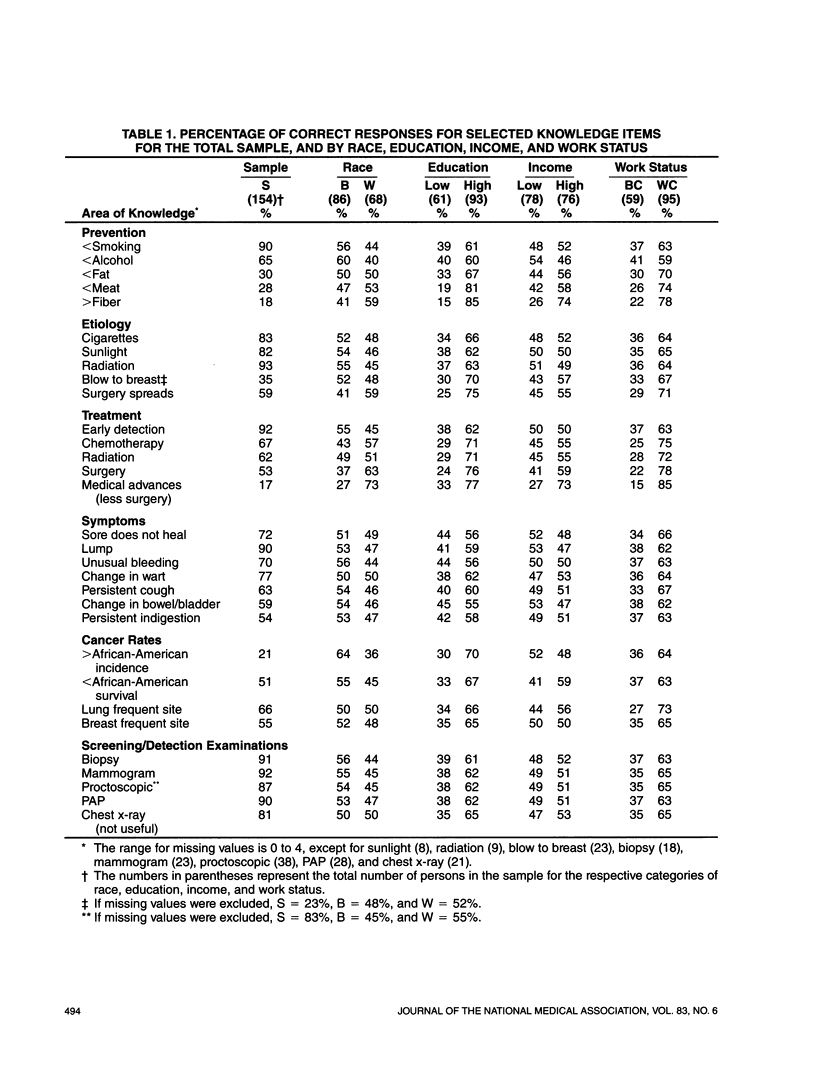
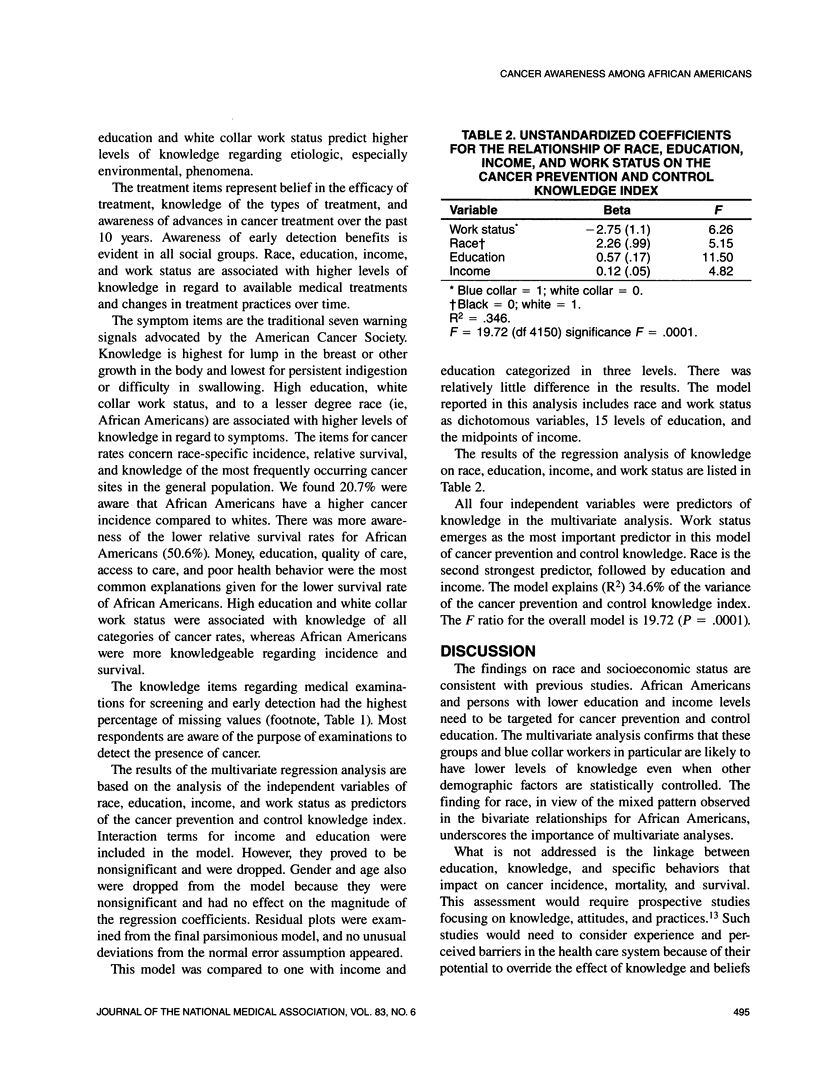
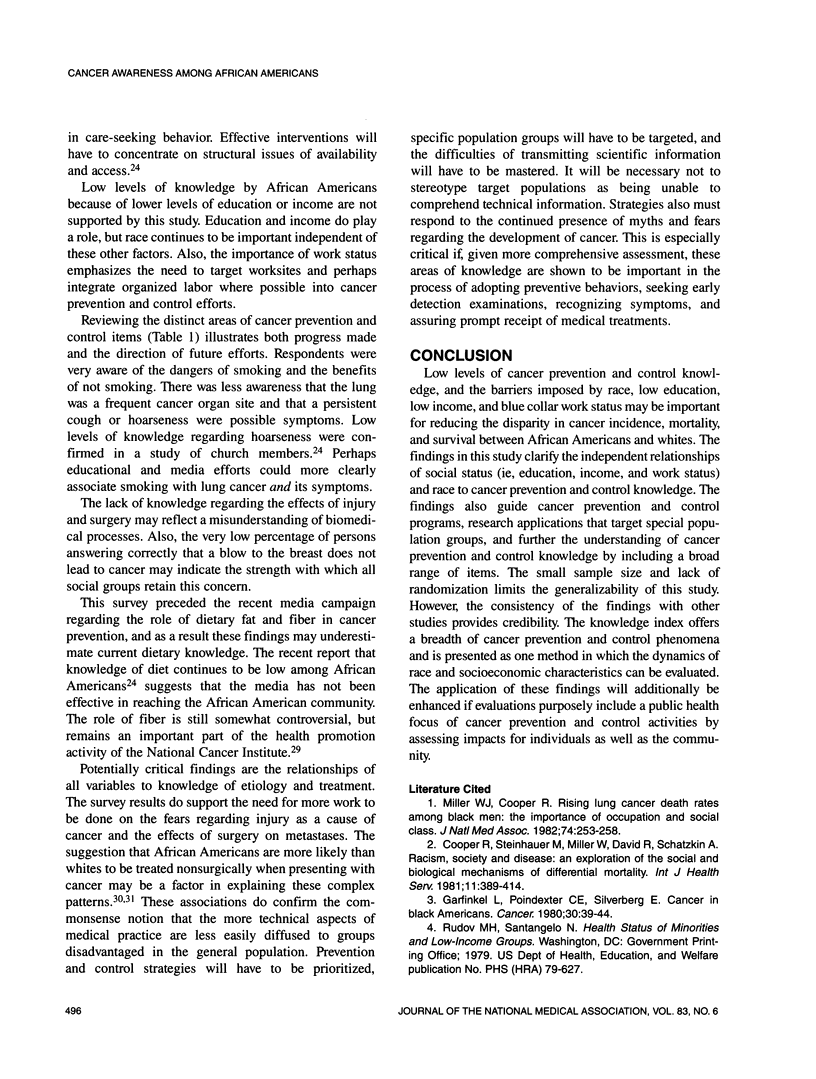
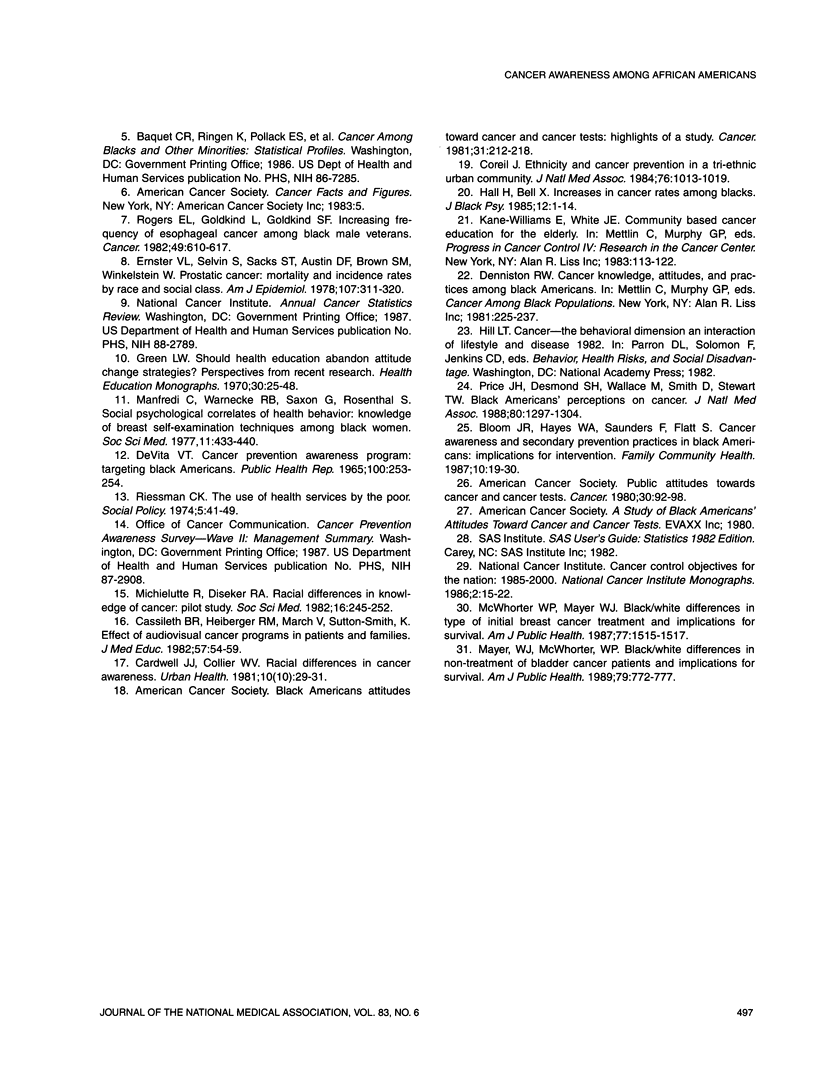
Selected References
These references are in PubMed. This may not be the complete list of references from this article.
- Cassileth B. R., Heiberger R. M., March V., Sutton-Smith K. Effect of audiovisual cancer programs on patients and families. J Med Educ. 1982 Jan;57(1):54–59. doi: 10.1097/00001888-198201000-00012. [DOI] [PubMed] [Google Scholar]
- Cooper R., Steinhauer M., Miller W., David R., Schatzkin A. Racism, society, and disease: an exploration of the social and biological mechanisms of differential mortality. Int J Health Serv. 1981;11(3):389–414. doi: 10.2190/E437-2KB5-4HM0-7NJ0. [DOI] [PubMed] [Google Scholar]
- Coreil J. Ethnicity and cancer prevention in a tri-ethnic urban community. J Natl Med Assoc. 1984 Oct;76(10):1013–1019. [PMC free article] [PubMed] [Google Scholar]
- DeVita V. T., Jr Cancer Prevention Awareness Program: targeting black Americans. Public Health Rep. 1985 May-Jun;100(3):253–254. [PMC free article] [PubMed] [Google Scholar]
- Denniston R. W. Cancer knowledge, attitudes, and practices among black Americans. Prog Clin Biol Res. 1981;53:225–235. [PubMed] [Google Scholar]
- Ernster V. L., Selvin S., Sacks S. T., Austin D. F., Brown S. M., Winkelstein W., Jr Prostatic cancer: mortality and incidence rates by race and social class. Am J Epidemiol. 1978 Apr;107(4):311–320. doi: 10.1093/oxfordjournals.aje.a112546. [DOI] [PubMed] [Google Scholar]
- Garfinkel L., Poindexter C. E., Silverberg E. Cancer in black Americans. CA Cancer J Clin. 1980 Jan-Feb;30(1):39–44. doi: 10.3322/canjclin.30.1.39. [DOI] [PubMed] [Google Scholar]
- Manfredi C., Warnecke R. B., Graham S., Rosenthal S. Social psychological correlates of health behavior: knowledge of breast self-examination techniques among black women. Soc Sci Med. 1977 Apr;11(6-7):433–440. doi: 10.1016/0037-7856(77)90108-1. [DOI] [PubMed] [Google Scholar]
- Mayer W. J., McWhorter W. P. Black/white differences in non-treatment of bladder cancer patients and implications for survival. Am J Public Health. 1989 Jun;79(6):772–775. doi: 10.2105/ajph.79.6.772. [DOI] [PMC free article] [PubMed] [Google Scholar]
- McWhorter W. P., Mayer W. J. Black/white differences in type of initial breast cancer treatment and implications for survival. Am J Public Health. 1987 Dec;77(12):1515–1517. doi: 10.2105/ajph.77.12.1515. [DOI] [PMC free article] [PubMed] [Google Scholar]
- Miller W. J., Jr, Cooper R. Rising lung cancer death rates among black men: the importance of occupation and social class. J Natl Med Assoc. 1982 Mar;74(3):253–258. [PMC free article] [PubMed] [Google Scholar]
- Price J. H., Desmond S. M., Wallace M., Smith D., Stewart P. W. Black Americans' perceptions of cancer. A study utilizing the Health Belief Model. J Natl Med Assoc. 1988 Dec;80(12):1297–1304. [PMC free article] [PubMed] [Google Scholar]
- Rogers E. L., Goldkind L., Goldkind S. F. Increasing frequency of esophageal cancer among black male veterans. Cancer. 1982 Feb 1;49(3):610–617. doi: 10.1002/1097-0142(19820201)49:3<610::aid-cncr2820490335>3.0.co;2-m. [DOI] [PubMed] [Google Scholar]


